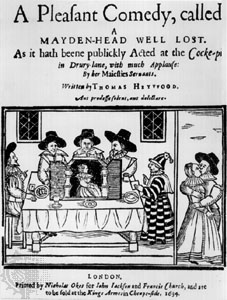Related Research Articles

James Shirley was an English dramatist.
This article contains information about the literary events and publications of 1655.

Thomas Dekker was an English Elizabethan dramatist and pamphleteer, a versatile and prolific writer, whose career spanned several decades and brought him into contact with many of the period's most famous dramatists.

Thomas Heywood was an English playwright, actor, and author. His main contributions were to late Elizabethan and early Jacobean theatre. He is best known for his masterpiece A Woman Killed with Kindness, a domestic tragedy, which was first performed in 1603 at the Rose Theatre by the Worcester's Men company. He was a prolific writer, claiming to have had "an entire hand or at least a maine finger in two hundred and twenty plays", although only a fraction of his work has survived.

Thomas Killigrew was an English dramatist and theatre manager. He was a witty, dissolute figure at the court of King Charles II of England.
Robert Davenport was an English dramatist of the early seventeenth century. Nothing is known of his early life or education; the title pages of two of his plays identify him as a "Gentleman," though there is no record of him at either of the two universities or the Inns of Court. Scholars have guessed that he was born c. 1590; if, as some scholars think, he wrote the Address "To the knowing Reader" in the first quarto of King John and Matilda, he was still alive in 1655. He enters the historical record in 1624, when two of his plays were licensed by the Master of the Revels.

Christopher Vernon Hassall was an English actor, dramatist, librettist, lyricist and poet, who found his greatest fame in a memorable musical partnership with the actor and composer Ivor Novello after working together in the same touring company. He was also a noted biographer of Rupert Brooke and Edward Marsh.
Gerard Langbaine was an English dramatic biographer and critic, best known for his An Account of the English Dramatic Poets (1691), the earliest work to give biographical and critical information on the playwrights of English Renaissance theatre. He is sometimes called Junior or the Younger to distinguish him from his father (1609–58) of the same name, a Doctor of Divinity who was Provost of The Queen's College, Oxford (1646–58) and Keeper of the University Archives.

The Merry Devil of Edmonton is an Elizabethan-era stage play; a comedy about a magician, Peter Fabell, nicknamed the Merry Devil. It was at one point attributed to William Shakespeare, but is now considered part of the Shakespeare Apocrypha.
The Sisters is a Caroline stage play, a comedy written by James Shirley. It was the last of Shirley's plays performed in London prior to the closing of the theatres in September 1642, at the start of the English Civil War. "Slight in substance, The Sisters is excellent in matter of technique, and especially in...structural unity...."
Robert Daborne was an English dramatist of the Jacobean era.
Pathomachia, or the Battle of Affections, also known as Love's Lodestone, is an early 17th-century play, first printed in 1630. It is an allegory that presents a range of problems to scholars of the drama of the Jacobean and Caroline eras.
The Parson's Wedding is a Caroline era stage play, a comedy written by Thomas Killigrew. Often regarded as the author's best play, the drama has sometimes been considered an anticipation of Restoration comedy, written a generation before the Restoration; "its general tone foreshadows the comedy of the Restoration from which the play is in many respects indistinguishable."
The Downfall of Robert Earl of Huntingdon and The Death of Robert Earl of Huntingdon are two closely related Elizabethan-era stage plays on the Robin Hood legend, that were written by Anthony Munday in 1598 and published in 1601. They are among the relatively few surviving examples of the popular drama acted by the Admiral's Men during the Shakespearean era.
A New Trick to Cheat the Devil is an early seventeenth-century stage play, a comedy written by Robert Davenport that was first printed in 1639. One of only three surviving Davenport plays, it has been called an entertaining and extravagant farce.
Peter Fabell or Fabel was a reputed English magician who lived in Edmonton. A literary figure during the 16th and 17th century, he is considered by David Kathman to have been a historical figure, whatever the accretion of folklore to his name. He appears as the protagonist in the play The Merry Devil of Edmonton, printed 1608.
Thomas Brewer was an English writer, of whose life no details are known.
Thomas Jordan was an English poet, playwright and actor, born possibly in London or Eynsham in Oxfordshire about 1612 or 1614.
References
![]() This article incorporates text from a publication now in the public domain : "Brewer, Antony". Dictionary of National Biography . London: Smith, Elder & Co. 1885–1900.
This article incorporates text from a publication now in the public domain : "Brewer, Antony". Dictionary of National Biography . London: Smith, Elder & Co. 1885–1900.